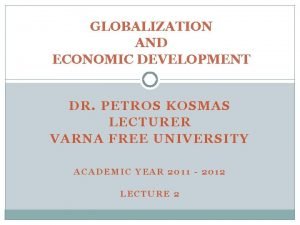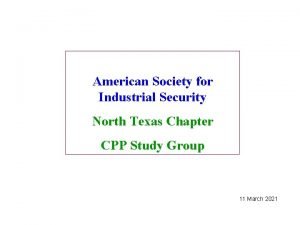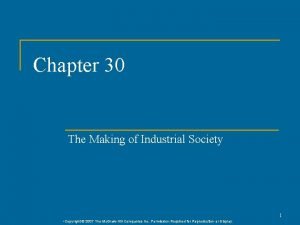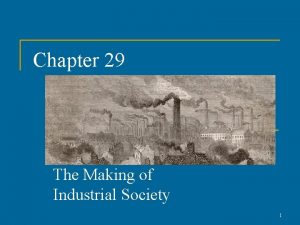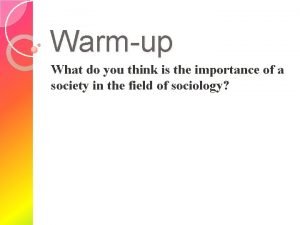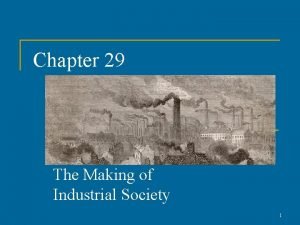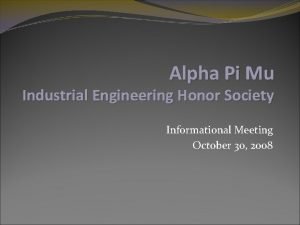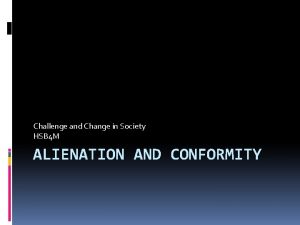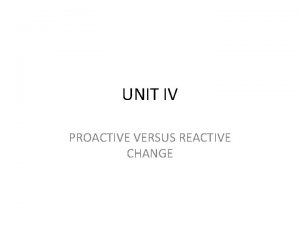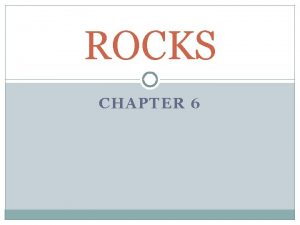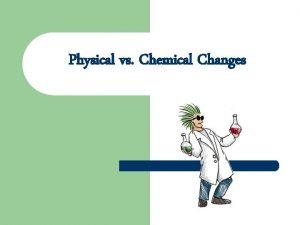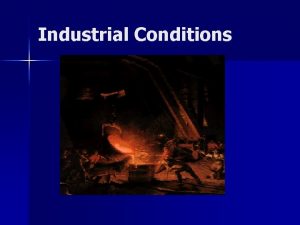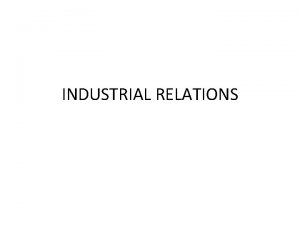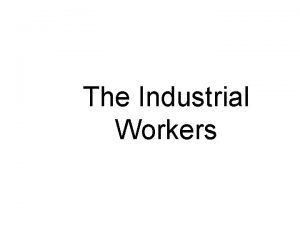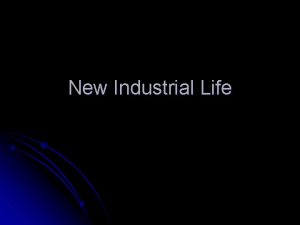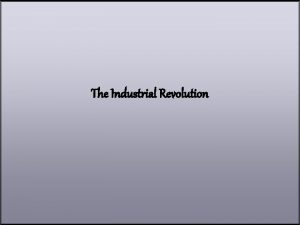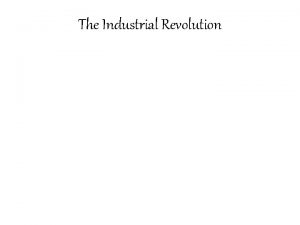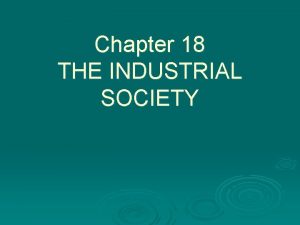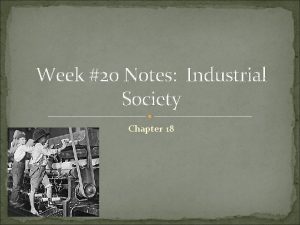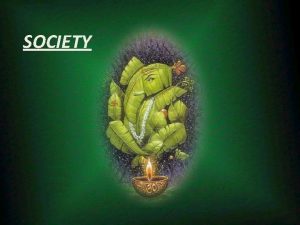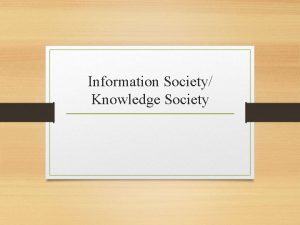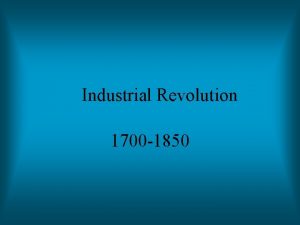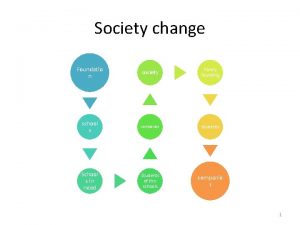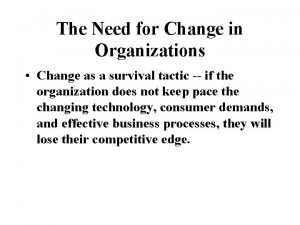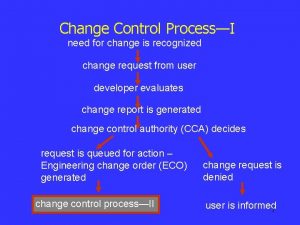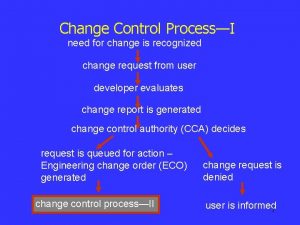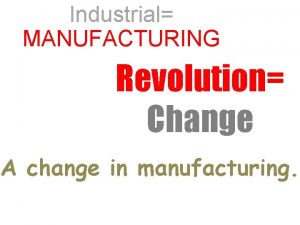Change in Society Industrial Society need Industrial Change


























- Slides: 26

Change in Society Industrial Society need Industrial Change

How do the times force change? What were the major classes in society? n How was your wealth determined? n What were the values of society before the Industrial Revolution? n How have those values changed? n

New Social Order Went from simple division, (royalty, nobles, middle class, church), n To more complex social structure: Upper mid-class: (government and military personal) middle class: (doctors, lawyers, scientists) lower mid class: (teachers, office workers, clerks) Poor: (homeless, slums, factory workers) *The lower classes struggled to keep up with the upper middle class. * n

Social Darwinism How does the division in the classes cause change in scientific thinking about human nature and survival? n How can this new theory be both a benefit and negative to future generations? n How would you feel if you were considered to be the weak link? n

How does Liaise Faire Economics cause a problem in Society? How does having NO government regulation of trade and business cause a negative in this new industrial society? n How does competition and drive benefit the worker? n How does laise faire economics affect the worker in the factory? n

Change in Government How does the current situation cause change in the government? n Why were people more open to radial idea? n How will the current government attempt to restore order and reduce interest in these radical ideas? n

Government Intervention n n As classes struggled, governments in England, France, America, and other industrial nations were forced to look at the situation and make changes The workers were able to successfully organize and demand change for the better Governments eventually adopted an 8 hour work day, child labor laws, a minimum wages, and health and safety standards both in the work place and at home, and restrictions on monopolies Sewage systems were constructed, unions allowed, the slums were attempted to be cleaned up…

What are mutual – aid societies? Mutual aid was set up to help the sick and disabled n First step to organizing n What radical thinkers pushed for the workers organizing and labor unions? Why do you think that group was the one’s pushing for unity? n

Changes in the Industrial Society n n n Women began the fight for their right to vote, (suffrage movement) Middle class became focused on appearance, and being proper Poor and lower classes tried to model middle class standards Public Education and Higher learning became priorities in society. Religion became more focused on charities and aiding the poor

Have’s v. Have Not’s n n n n Wealthy lived in comfortable homes in “suburbs” (Have’s: merchants, skilled workers, factory owners Middle class women became “ladies” and did not work in industry Middle class ignored workers Poor lived in “slums”, “ghettos” (have not’s) Crowed into dimly lit, small, tenant buildings No running water, shared water pump No way to discard waste, sewage system Could smell the “slums” before you got into them Attempted revolts quickly put down

Socialism Socialists – viewed the capitalist system as inherently wrong Belief that capitalism is designed to create poverty and poor working conditions because of its end goal of earning maximum profits for investors Socialism – government owns the means of production Belief that if the government (“the people”) owns the means of production, these factories and industries will function in the public (as opposed to private) interest

Early Socialist Movement n First socialists were Utopians Strove to create a fair and just system l Community divided tasks and rewards equitably l Robert Owen n Charles Fourier n Claude Saint-Simon n Louis Blanc n

Robert Owen (1771 -1858) Utopian socialist Owned a textile factory in New Lanark, Scotland Set up a model community in New Harmony, Indiana Decreased working hours Improved working conditions and employee housing Shared management and profits with employees Proved that a socialist-based company could be profitable

Karl Marx (1818 -1883) German socialist (communist) philosopher Forced to leave Prussia for articles attacking the Prussian government Relocated to France where he was considered too radical Wrote (1848) Relocated to England where he lived out the rest of his life Wrote Communist Manifesto with Friedrich Engels Das Kapital – the “bible” of socialism (1867) “Religion is the opiate of the people. ” Belief that religion is designed to keep people submissive to those in power by promising them that their reward is in heaven

Marxism – Communism Workers of the World Unite!!! Economic Interpretation of History • Economic changes lead to historical changes. • Historically, the wealthy classes have held all power. Class Struggle • History has been a struggle between the rich and the poor. • In the Industrial Revolution, the struggle is between the capitalists (owners of the means of production) and the proletariat (workers). Surplus Value • Workers produce all wealth but receive only enough to survive. • “Surplus value” (profit) of the workers’ labor goes to the capitalists. Inevitability of Socialism • Industrial wealth leads to the concentration of wealth among fewer and fewer capitalists, while the living and working conditions of the proletariat grow worse. • The proletariat will eventually rebel and create a socialist state.

Changes in the Industrial Society Continued: n How was art changed?


Munch’s The Scream


Changes in the Industrial Society Continued n How was novels and poetry changed?

La Marseillaise Poetry Arise, children of the Fatherland, The day of glory has arrived! Against us the tyranny The bloodied banner is raised. (repeat) Do you hear in the countryside The roar of those ferocious soldiers? They come right here among us To slaughter our sons and wives!

Poetry "Because I was happy upon the heath, And smiled among the winter's snow, They clothed me in the clothes of death, And taught me to sing the notes of woe. "And because I am happy and dance and sing, They think they have done me no injury, And are gone to praise God and his priest and king, Who make up a heaven of our misery. "

Novel n There were the men in the pickle rooms, for instance, where old Antanas had gotten his death; scarce a one of these that had not some spot of horror on his person. Let a man so much as scrape his finger pushing a truck in the pickle rooms, and he might have a sore that would put him out of the world; all the joints in his fingers might be eaten by the acid, one by one. Of the butchers and floorsmen, the beef-boners and trimmers, and all those who used knives, you could scarcely find a person who had the use of his thumb; time and time again the base of it had been slashed, till it was a mere lump of flesh against which the man pressed the knife to hold it. The hands of these men would be criss- crossed with cuts, until you could no longer pretend to count them or to trace them. They would have no nails, – they had worn them off pulling hides; their knuckles were swollen so that their fingers spread out like a fan. There were men who worked in the cooking rooms, in the midst of steam and sickening odors, by artificial light; in these rooms the germs of tuberculosis might live for two years, but the supply was renewed every hour. There were the beef-luggers, who carried two-hundredpound quarters into the refrigerator-cars; a fearful kind of work, that began at four o'clock in the morning, and that wore out the most powerful men in a few years. There were those who worked in the chilling rooms, and whose special disease was rheumatism; the time limit that a man could work in the chilling rooms was said to be five years.

Changes in the Industrial Society Continued n How was news changed?


How did the Industrial Revolution become a turning point in World History? n Look back on all your notes from the beginning of this unit. How did the industrial revolution change the world. Look at the five points in the “Welcome to the Jungle” packet. Can you explain them?
 Five things we need to know about technological change
Five things we need to know about technological change Gertler econ
Gertler econ Industrial society
Industrial society Features of industrial society
Features of industrial society American society industrial security
American society industrial security Chapter 30 the making of industrial society
Chapter 30 the making of industrial society Chapter 29 the making of industrial society
Chapter 29 the making of industrial society Characteristics of pastoral
Characteristics of pastoral The making of industrial society chapter 29
The making of industrial society chapter 29 Industrial engineering honor society
Industrial engineering honor society Hsb4u assignments
Hsb4u assignments Hsb4m
Hsb4m Is mashing potatoes a physical or chemical change
Is mashing potatoes a physical or chemical change Meaning of physical change
Meaning of physical change Absolute change and relative change formula
Absolute change and relative change formula What is integers
What is integers Whats the difference between a chemical and physical change
Whats the difference between a chemical and physical change Change in supply vs change in quantity supplied
Change in supply vs change in quantity supplied Supply and demand curve shifts
Supply and demand curve shifts Enagic founder
Enagic founder Proactive vs reactive change
Proactive vs reactive change Physical and chemical changes examples
Physical and chemical changes examples Spare change physical versus chemical change
Spare change physical versus chemical change Rocks change due to temperature and pressure change
Rocks change due to temperature and pressure change Whats physical change
Whats physical change How does a physical change differ from a chemical change
How does a physical change differ from a chemical change Study jams physical and chemical changes
Study jams physical and chemical changes



